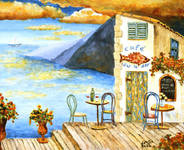Every Craftsman by Rumi
For the past week or so I’ve been looking for a poem that would speak somehow to revision—and I couldn’t quite find what I was looking for. And then I found this poem by Rumi. It’s not what I thought I was looking for—it does something slightly different. But at the same time it feels like the right next image for revision. For looking again. For looking at the big picture. And what was it again that I wanted to write? What did I hope would come of this? What can I do with the pages I’ve written? What do I hope will come of this? Not infrequently, I find that when people come up against a serious illness or a serious loss–or any kind of significant transition—they may find themselves, eventually, asking certain kinds of questions: And what is it that I’m here for? What is my piece? What is my gift? What do I want to leave behind? Rumi’s poem, Every Craftsman, speaks to these questions. Here are the first 17 lines: I’ve said before that every craftsman searches for what’s not there to practice his craft. A builder looks for the rotten hole where the roof caved in. A water-carrier picks the empty pot. A carpenter stops at the house with no door. Workers rush toward some hint of emptiness, which they then start to fill. Their hope, though, is for emptiness, so don’t think you must avoid it. It contains what you need! Dear soul, if you were not friends with the vast nothing inside, why would you always be casting your net into it, and waiting so patiently? Rumi’s poem is another way of asking: What is the one piece of writing that you, and only you, can write? What emptiness is waiting to be filled? Orhan Pamuk, a Turkish writer, said (among other things) in his Nobel Prize acceptance speech: “I write because I want others, the whole world, to know what sort of life we lived, and continue to live, in Istanbul, in Turkey.” What sort of life is it that you—and only you—can write about? What gap is waiting?...
read more

